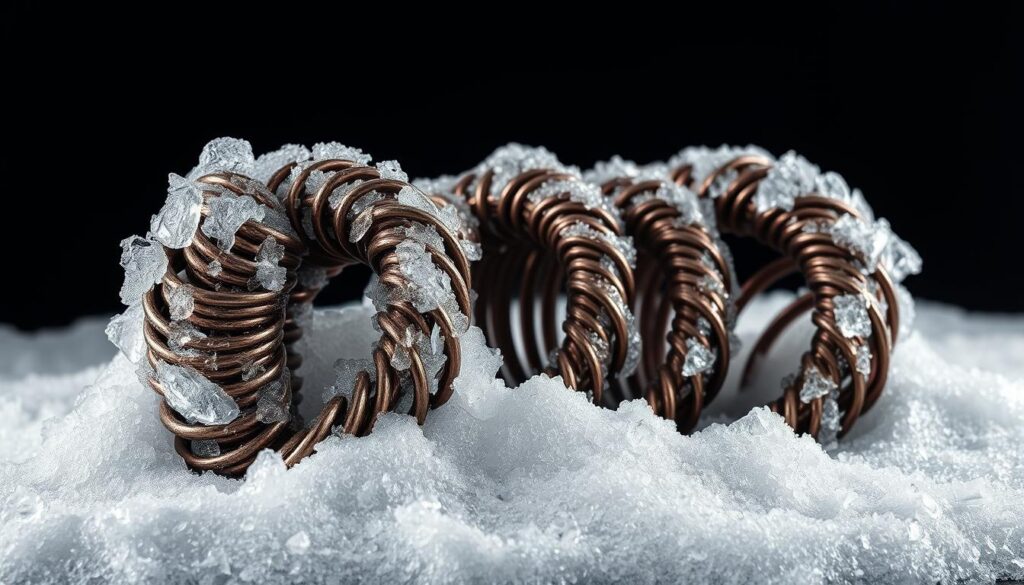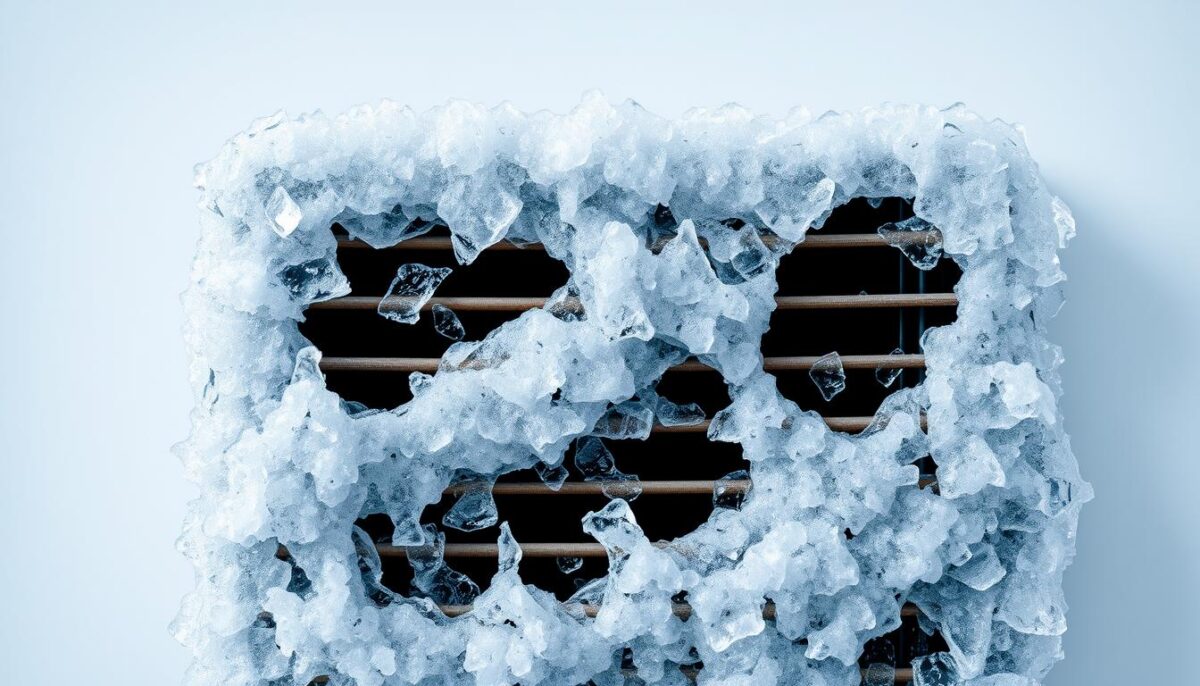Frozen AC Coils? Here’s Why It Happens and How to Fix It
Is your air conditioning system not cooling your home effectively? One possible cause could be frozen evaporator coils. When this happens, your HVAC unit can’t absorb heat properly, leading to inefficient cooling or even a complete stop.
This comprehensive guide will walk you through the reasons behind frozen coils, how to identify the issue, and step-by-step solutions to fix it. Understanding the mechanics behind this common problem can help you troubleshoot and potentially save on costly repairs.
By the end of this article, you’ll be equipped with the knowledge to address the issue and maintain optimal cooling performance year-round.
Key Takeaways
- Understand the causes of frozen evaporator coils
- Learn how to identify the problem with your air conditioner
- Discover step-by-step solutions to fix the issue
- Find out how to maintain your HVAC system for optimal performance
- Prevent future AC freezing issues with simple maintenance tips
Understanding Frozen AC Coils
Frozen AC coils can be a frustrating issue for homeowners, but understanding their function and the problems they cause can help in resolving the issue. The air conditioning system relies on its coils to facilitate the cooling process.
What Are AC Coils and How Do They Work?
AC coils are essential components that carry refrigerant and absorb heat before moving it to the next part of the AC system. The evaporator coil, located indoors, absorbs heat from the indoor air, while the condenser coil, located outdoors, releases that heat outside. They work together during the refrigeration cycle to keep your home cool and comfortable.
Why Frozen Coils Are a Serious Problem
When coils freeze, they become insulated by ice, which prevents proper heat transfer and disrupts the entire cooling cycle. This forces your system to work harder while producing less cooling, leading to increased energy consumption and higher utility bills. If left untreated, frozen coils can cause serious damage to your air conditioning system, including compressor failure, which is one of the most expensive AC repairs.
Common Causes of Frozen AC Coils

Understanding the reasons behind frozen AC coils is crucial for effective troubleshooting and maintenance. When the coils freeze, it can lead to a cascade of problems, including reduced cooling performance and increased energy bills. Several factors can contribute to this issue, and identifying them is the first step towards a solution.
Restricted Airflow Issues
One of the primary causes of frozen coils is restricted airflow. When warm air cannot flow properly over the evaporator coil, the temperature drops below freezing, causing the moisture in the air to freeze on the coils. This can happen due to various reasons such as closed or blocked supply vents, dirty evaporator coils, or problems with the blower fan.
Dirty Air Filters
Dirty air filters significantly reduce airflow through your AC system, creating an environment conducive to ice formation on the coils. It’s recommended to check filters monthly and replace them every 30-90 days to maintain proper airflow and prevent coil freezing.
Refrigerant Leaks and Low Refrigerant Levels
Refrigerant leaks or incorrect refrigerant levels can disrupt the pressure balance in your AC system, causing the evaporator coil to become too cold and freeze. Signs of refrigerant issues include hissing sounds or oily residue around connections. It’s essential to address refrigerant leaks promptly, as they can lead to more severe problems.
Thermostat Problems
A malfunctioning thermostat can cause your AC to run continuously without cycling off, eventually leading to frozen coils. This issue is particularly noticeable when coils freeze overnight due to the prolonged operation.
Blocked or Clogged Condensate Lines
Blocked condensate drain lines prevent the proper drainage of moisture that naturally forms on the evaporator coil. When water accumulates and eventually freezes, it can cause the coil to freeze. Ensuring that the drain pan and lines are clear is crucial for preventing coil freezing and associated water damage.
Signs That Your AC Coils Are Frozen
Identifying the signs of frozen AC coils is crucial for maintaining your air conditioner’s efficiency and preventing further damage. When your AC coils freeze, it can lead to a range of issues that affect your home’s comfort and your system’s longevity.
Several key indicators can signal that your AC coils are frozen. Being aware of these signs can help you take prompt action to address the issue.
Visible Ice on Indoor or Outdoor Units
One of the most obvious signs of frozen coils is the presence of visible ice on either the indoor evaporator coil or the outdoor unit. You might need to remove the access panel to inspect the indoor coil. Visible ice formation is a clear indicator that something is amiss.
AC Running But Not Cooling
If your air conditioner is running continuously but failing to cool your home, it could be a sign that the coils are frozen. The ice prevents the coils from absorbing heat properly, leading to inadequate cooling.
Warm Air Blowing From Vents
When warm air blows from your vents despite the thermostat being set to a cool temperature, it indicates that your system is struggling to cool the air effectively. Frozen coils can cause this issue by hindering the heat absorption process.
Water Leakage and Puddles Near the Unit
Water leakage or puddles forming around your indoor unit can occur when the ice on the coils begins to melt. This can potentially cause water damage to surrounding areas, making it essential to address the issue promptly.
Other signs that may indicate frozen AC coils include unusual sounds from your air conditioner, reduced airflow from your vents, and higher than normal utility bills. Monitoring your system’s performance and being aware of these signs can help you identify and fix issues before they escalate.
Step-by-Step Guide to Fix Frozen AC Coils
Fixing frozen AC coils involves several key steps that can help you get your air conditioning system back to normal operation. When your AC coils freeze, it can lead to a range of problems, including reduced cooling performance and potential damage to your system. By following these steps, you can address the issue effectively and prevent future occurrences.
Turn Off Your AC System Immediately
The first step when dealing with frozen AC coils is to turn off your AC system immediately. This is crucial to prevent any further damage to the compressor and other critical components. Switching off the system allows you to start the thawing process and assess the situation without risking additional harm to your air conditioner.
Allow the Coils to Thaw Completely
After turning off your AC, allow the coils to thaw completely. This process typically takes around 24 hours, depending on the extent of the freezing and the ambient temperature. It’s essential to be patient and not attempt to rush the thawing process by chipping at the ice, as this can damage the delicate coil fins.
Check and Replace Dirty Air Filters
While waiting for the coils to thaw, check your air filters and replace them if they appear dirty or clogged. Dirty air filters are a common cause of restricted airflow, which can lead to frozen coils. Replacing them can often resolve the issue and improve the overall efficiency of your air conditioning system.
Run the Fan to Help Thaw the Coils
To help speed up the thawing process, set your thermostat to “fan only” mode. This setting circulates warm air over the frozen evaporator coil without activating the cooling cycle, thereby aiding in the thawing process. This step can be particularly helpful in getting your system back to normal operation more quickly.
Clean the Coils and Surrounding Areas
Once the coils have thawed, clean the coils and surrounding areas to remove any dust or debris that might be restricting airflow. Specialized coil cleaners are available for this purpose, but in some cases, professional cleaning may be recommended to ensure thorough maintenance.
Check the Condensate Drain Line
It’s also important to inspect the condensate drain line for any clogs or blockages. Look for signs of standing water in the drain pan or use a wet/dry vacuum to clear the line if necessary. A clogged condensate drain line can lead to further issues, including water damage and reduced system performance.
After completing these steps, run your system on fan-only mode for several hours to ensure all components are completely dry before resuming normal cooling operation. Monitor your air conditioner closely over the next few days to ensure the problem doesn’t recur, which could indicate a more serious underlying issue.
Preventing Future AC Coil Freezing
Regular upkeep of your HVAC system is essential to prevent issues like frozen AC coils. By implementing a few simple maintenance practices, you can significantly reduce the risk of coil freezing and ensure your air conditioning system operates efficiently throughout its lifespan.
Regular Air Filter Replacement Schedule
Establishing a regular air filter replacement schedule is crucial for preventing frozen coils. Homes with pets, allergies, or high dust levels may need monthly changes, while others can go 2-3 months between replacements. A dirty air filter can restrict airflow, causing the coils to freeze. By keeping your air filter clean, you can maintain proper airflow and reduce the risk of coil freezing.
Proper Airflow Maintenance
Maintaining proper airflow throughout your home is vital. Keep all vents open and unobstructed, even in unused rooms, as closing vents creates pressure imbalances that can lead to frozen coils. Additionally, ensure that the area around your outdoor condenser unit is clear of debris, vegetation, and obstructions to maintain proper airflow and heat dissipation.
Annual Professional HVAC Maintenance
Scheduling annual professional HVAC maintenance before the cooling season begins is highly recommended. A qualified HVAC technician can ensure your system is clean, properly charged with refrigerant, and operating efficiently. This maintenance can help prevent refrigerant leaks and other issues that lead to frozen coils.
Monitoring Refrigerant Levels
Having a qualified HVAC technician check refrigerant levels during maintenance visits is crucial. Both overcharging and undercharging can contribute to coil freezing issues. Proper refrigerant levels ensure that your system operates efficiently and effectively.
Other preventive measures include:
- Considering the installation of a programmable thermostat to prevent excessive system cycling and maintain consistent temperatures throughout your home.
- Having your ductwork inspected for leaks or restrictions that might be reducing airflow to the evaporator coil.
- Cleaning your evaporator coil professionally every 1-2 years to remove built-up dirt and debris.
- Monitoring your system’s performance regularly for early warning signs of potential freezing issues.
When to Call an HVAC Professional
If your air conditioning system continues to malfunction with frozen coils, professional assistance is necessary. Despite attempting basic troubleshooting steps such as changing the air filter or clearing the condensate drain line, if the issue persists, it’s a clear indication that expert help is required.
Persistent freezing issues often signify a more complex problem that requires the attention of an HVAC technician. These professionals can conduct a thorough analysis, including checking refrigerant levels, system pressures, and airflow, to diagnose the root cause of the issue.
Some scenarios that necessitate immediate professional help include refrigerant leaks, indicated by hissing sounds or oil spots around the unit, and repeated freezing despite proper maintenance. HVAC technicians have the specialized tools and certification needed to handle refrigerant-related issues and other complex problems.
By calling an HVAC professional, you can ensure that your air conditioning system is properly repaired, and future issues are prevented through regular maintenance plans. Depending on the age of your system and the extent of repairs needed, your technician can also advise on whether repair or replacement is the most cost-effective solution.




